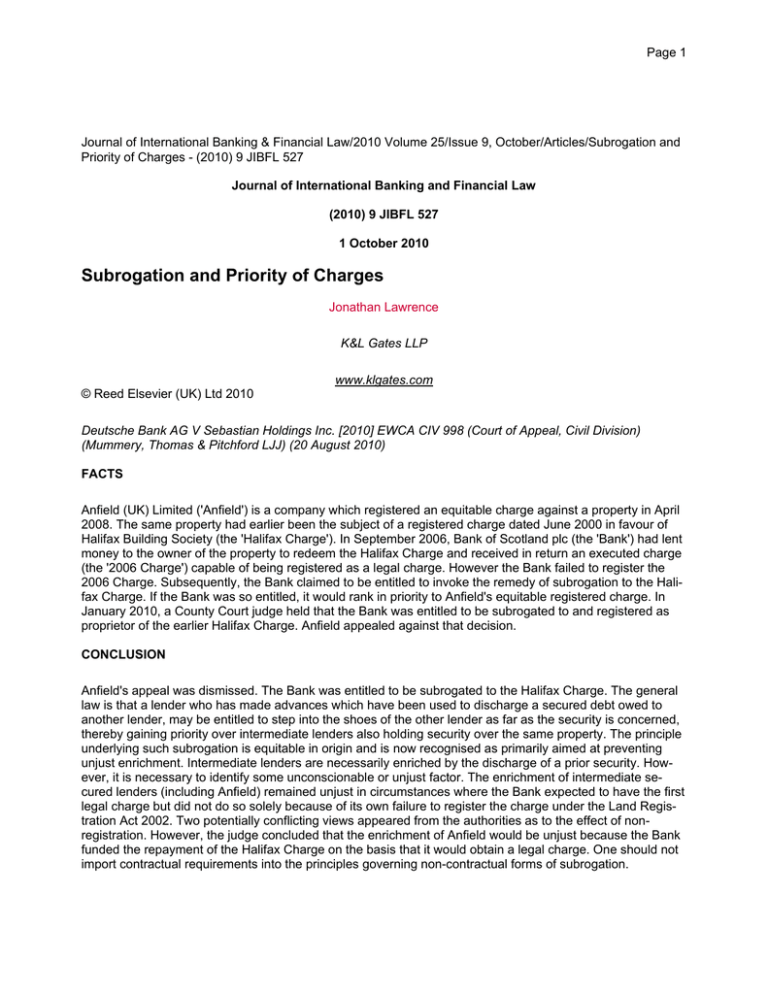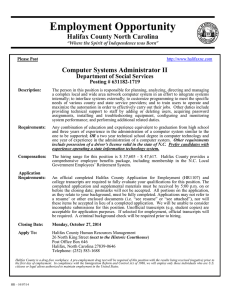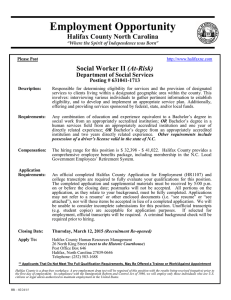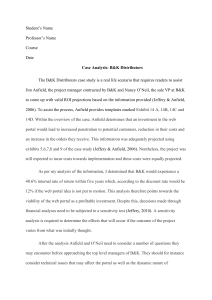Page 1
advertisement

Page 1
Journal of International Banking & Financial Law/2010 Volume 25/Issue 9, October/Articles/Subrogation and
Priority of Charges - (2010) 9 JIBFL 527
Journal of International Banking and Financial Law
(2010) 9 JIBFL 527
1 October 2010
Subrogation and Priority of Charges
Jonathan Lawrence
K&L Gates LLP
www.klgates.com
© Reed Elsevier (UK) Ltd 2010
Deutsche Bank AG V Sebastian Holdings Inc. [2010] EWCA CIV 998 (Court of Appeal, Civil Division)
(Mummery, Thomas & Pitchford LJJ) (20 August 2010)
FACTS
Anfield (UK) Limited ('Anfield') is a company which registered an equitable charge against a property in April
2008. The same property had earlier been the subject of a registered charge dated June 2000 in favour of
Halifax Building Society (the 'Halifax Charge'). In September 2006, Bank of Scotland plc (the 'Bank') had lent
money to the owner of the property to redeem the Halifax Charge and received in return an executed charge
(the '2006 Charge') capable of being registered as a legal charge. However the Bank failed to register the
2006 Charge. Subsequently, the Bank claimed to be entitled to invoke the remedy of subrogation to the Halifax Charge. If the Bank was so entitled, it would rank in priority to Anfield's equitable registered charge. In
January 2010, a County Court judge held that the Bank was entitled to be subrogated to and registered as
proprietor of the earlier Halifax Charge. Anfield appealed against that decision.
CONCLUSION
Anfield's appeal was dismissed. The Bank was entitled to be subrogated to the Halifax Charge. The general
law is that a lender who has made advances which have been used to discharge a secured debt owed to
another lender, may be entitled to step into the shoes of the other lender as far as the security is concerned,
thereby gaining priority over intermediate lenders also holding security over the same property. The principle
underlying such subrogation is equitable in origin and is now recognised as primarily aimed at preventing
unjust enrichment. Intermediate lenders are necessarily enriched by the discharge of a prior security. However, it is necessary to identify some unconscionable or unjust factor. The enrichment of intermediate secured lenders (including Anfield) remained unjust in circumstances where the Bank expected to have the first
legal charge but did not do so solely because of its own failure to register the charge under the Land Registration Act 2002. Two potentially conflicting views appeared from the authorities as to the effect of nonregistration. However, the judge concluded that the enrichment of Anfield would be unjust because the Bank
funded the repayment of the Halifax Charge on the basis that it would obtain a legal charge. One should not
import contractual requirements into the principles governing non-contractual forms of subrogation.




